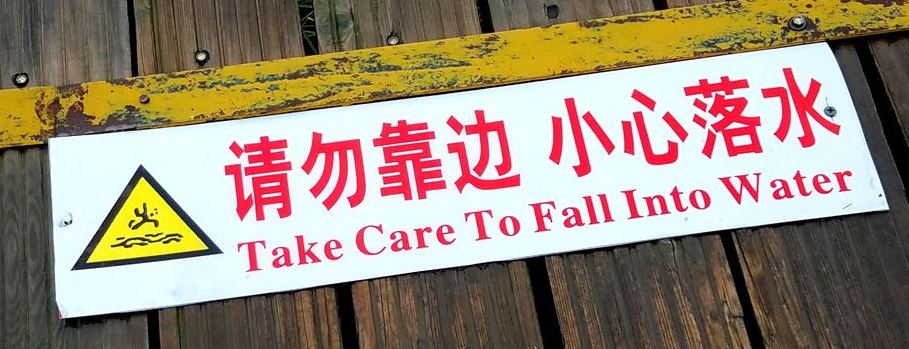Take Care To Fall Into Water
« previous post | next post »
From Bobby Shore:
The Chinese says:
qǐng wù kàobiān xiǎoxīn luòshuǐ
请勿靠边 小心落水
"Please don't get close to the edge; be careful [not] to fall into the water"
This is misnegation of another kind than that which we usually encounter. Instead of too many negative words, here we have too few. Constructions such as this one not only trick machine translators; human translators also fall prey to them.
This is a good example of how translators must pay attention to the sense of a sentence as well as its structure. In the end, the sense of a sentence is more important than its structure. Understanding the sense of a sentence requires intelligence plus intuition. The former we are born with; the latter we can acquire through massive exposure to and close analysis of the target language into which we are translating.
Translators are especially prone to make this kind of mistake when rendering signs that have to do with slippery surfaces and the injunction to xiǎoxīn 小心 ("be careful") (see the "Readings" below, particularly the last one, which deals with the classic form of this type of error).
Readings
- "Crimes against English " (4/25/15)
- "Free souvenirs " (8/15/15)
- "Sandwiched in an escalator " (2/9/15)
- "Signs from Kashgar to Delhi " (10/11/13)
- "Slip carefully " (5/6/14)
[H.t. June Teufel Dreyer]

Andrew (not the same one) said,
January 24, 2019 @ 7:23 am
Because falling on dry ground would cause more damage?
Bloix said,
January 24, 2019 @ 9:18 am
A slightly non-idiomatic but correct translation could be "Beware of falling into water." So there are ways in English to express this sort of thing in English without explicitly using "not." A well-known example would be "Mind the gap."
Jenny Chu said,
January 24, 2019 @ 9:40 am
Word for word, it's something like:
Please don't stay-near side (please don't go close to the edge)
Be careful fall water (be careful, lest you fall into the water)
The interesting thing to me is that the "stay away from the edge" is completely missing in the translation. How are we supposed to know the best method for avoiding a fall, without this important detail?
Mark Meckes said,
January 24, 2019 @ 10:07 am
I've found that Google Translate has a terrible time translating French negative expressions into English (or did circa five years ago, when I frequently used it to help me understand things written in French). I suspect that the sometimes widely-spaced two-part negatives were more than the statistical model could handle.
bratschegirl said,
January 24, 2019 @ 12:08 pm
"Misnegation" is often a topic of conversation here, but if I recall correctly, that's usually applied to cases where there is one negative too many. Can something also fall under that heading when there is one too few?
Bill Taylor said,
January 24, 2019 @ 12:14 pm
I never really noticed that English has 2 different structures for sentences of warning –
"beware of" followed by "______ing" (no negation, the "negativity" is in the "beware")
versus
"Be careful" or "Take care" followed by "not to ________" where the negation is required.
I assume this is because "beware" evolved to take the preposition "of" plus a noun (beware of dog, falling rocks, etc.).
BobW said,
January 25, 2019 @ 8:32 am
When I was younger we used to drive on 2-lane roads in the US South. There were signs reading: "Watch for Falling Rocks." We would debate whether or not it meant that we should park until we saw one.
B.Ma said,
January 26, 2019 @ 2:33 am
@BobW, perhaps the "Watch" served as a sort of short-hand for "Watch Out"